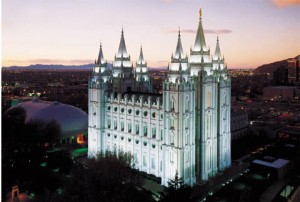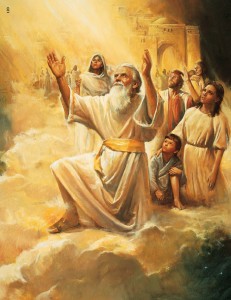Q. Why didn’t God create all His children to be like Christ?
This is a very good question, if we are all God’s children and He has created us, why do we have imperfections and Christ did not have any? Also related to this question is another we received, “Do Mormons believe that some people are better than others?” To answer these questions, I would like to go far back to before this world was created, when we all lived as spirits in the presence of our Heavenly Father.
First of all, it is important that we believe that God did not create us out of nothing, but rather He organized our intelligence into a spirit body. We do not know the nature of this intelligence, but it is an eternal part of our nature and being.
To the prophet Jeremiah, the Lord said, “Before I formed thee in the belly, I knew thee; and before thou camest forth out of the womb, I sanctified thee, and I ordained thee a prophet unto the nations.” Jeremiah 1:5 That is to say, the Lord knew Jeremiah even before his birth. He knew his strengths, his weaknesses, his personality and his potential. That also means that Jeremiah, as all the rest of us, had developed those traits by that point.
Bruce R. McConkie (1915-1985) of the twelve apostles wrote the following about how we came to be as we are:
“All the spirits of men, while yet in the Eternal Presence, developed aptitudes, talents, capacities, and abilities of every sort, kind, and degree. During the long expanse of life which then was, an infinite variety of talents and abilities came into being. As the ages rolled, no two spirits remained alike. Mozart became a musician; Einstein centered his interest in mathematics; Michelangelo turned his attention to painting. Cain was a liar, a schemer, a rebel. … Mary and Eve were two of the greatest of all the spirit daughters of the Father. … And so it went through all the hosts of heaven, each individual developing such talents and abilities as his soul desired.” (The Mortal Messiah, 4 vols. (1979–81), 1:23.)
It then follows that each individual chose a path before this life and through diligence and care to follow our Father’s guidance, each individual grew to varying degrees. The reason, then, that Christ is perfect and was able to fulfill His Father’s will perfectly in carrying out the Atonement was because He used his agency, or ability to choose, more wisely than others. He became like His Father.
The Book of Abraham gives a rare description of Jesus in the pre-earth life:
“And there stood one [Christ] among them that was like unto God, and he said unto those who were with him: We will go down, for there is space there, and we will take of these materials, and we will make an earth whereon these may dwell; And we will prove them herewith, to see if they will do all things whatsoever the Lord their God shall command them.” Abraham 3:24-25
That ability to choose is still available for us in this life and is the very reason that we are here. Every day we have the choice between following our Savior, Jesus Christ, and otherwise. Thus, through our choices, one person can excel in music, another in athletics, another in science and another in kindness, love or patience. Others can choose not to excel or to develop traits of laziness, procrastination and anger. Our options and potentials are limitless in either direction and everyone has parts of both.
The atonement of Jesus Christ plays the greatest part in our development. It is through His grace that we can correct our faults and that He can heal our wounded hearts. And then through His guidance, we will grow and choose the good, better, and best things in our lives.



 They spoke right to the difficulties that were coming with the economic crisis and the backlash against the church for proposition 8. Even though I have long believed that they can see “down the hall and around the corner”, re-reading and listening to their talks confirmed it for me yet again.
They spoke right to the difficulties that were coming with the economic crisis and the backlash against the church for proposition 8. Even though I have long believed that they can see “down the hall and around the corner”, re-reading and listening to their talks confirmed it for me yet again. us to avoid unnecessary debt for decades. Hmm, do you think they anticipated the calamitous financial crash of 2008? You betcha. It takes years to get out of debt, once you have accumulated it, so they gave us plenty of time to be free of it. Unnecessary debt is consumer debt. They say that the only things that are okay to take out loans for are school and a home. You should buy everything else when you can afford to buy it.
us to avoid unnecessary debt for decades. Hmm, do you think they anticipated the calamitous financial crash of 2008? You betcha. It takes years to get out of debt, once you have accumulated it, so they gave us plenty of time to be free of it. Unnecessary debt is consumer debt. They say that the only things that are okay to take out loans for are school and a home. You should buy everything else when you can afford to buy it. The prophet and apostles have stressed self-sufficiency for, well, forever. They have advised us to accumulate everything that we would need for a year or more. Recently, with the talk of an upcoming
The prophet and apostles have stressed self-sufficiency for, well, forever. They have advised us to accumulate everything that we would need for a year or more. Recently, with the talk of an upcoming  girls are advised to take back their self-respect by not presenting themselves as just a “body” to be admired, but a mind, heart, and soul–a complete person. Modesty protects. “Modest” doesn’t mean wrist and ankle-length clothing (though, undeniably, that
girls are advised to take back their self-respect by not presenting themselves as just a “body” to be admired, but a mind, heart, and soul–a complete person. Modesty protects. “Modest” doesn’t mean wrist and ankle-length clothing (though, undeniably, that  “…live in thanksgiving daily, for the many mercies and blessings which the Lord doth bestow upon you.”
“…live in thanksgiving daily, for the many mercies and blessings which the Lord doth bestow upon you.”  It’s an odd thing to consider that of the great Ten Commandments that the God of Israel gave to Moses on Mount Sinai, the one He chose to expound upon the longest is also perhaps the most disregarded in our modern society:
It’s an odd thing to consider that of the great Ten Commandments that the God of Israel gave to Moses on Mount Sinai, the one He chose to expound upon the longest is also perhaps the most disregarded in our modern society: A scriptural favorite of mine is the
A scriptural favorite of mine is the